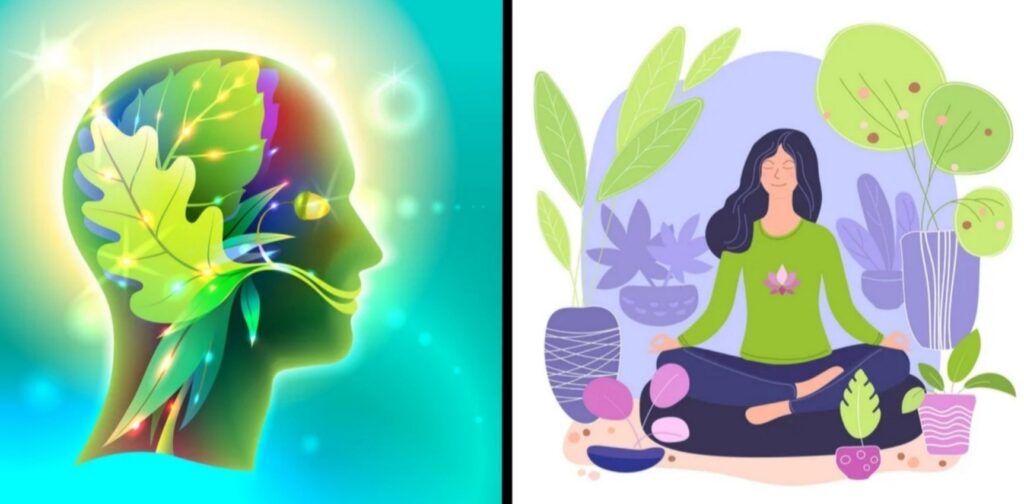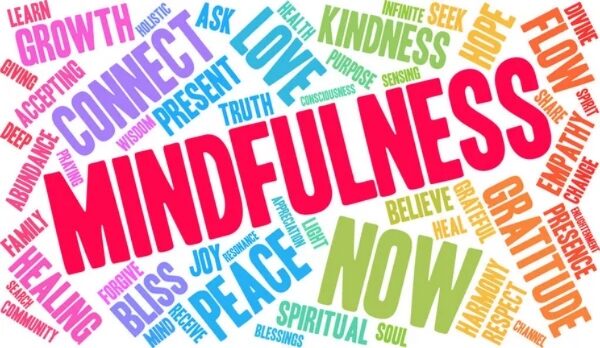Living mindfully in the current, demanding and hurried modern world while finding balance and inner peace is a universal challenge. However, amidst the chaos, there is a timeless practice that offers a pathway to greater well-being and contentment nourishing our body, mind, and soul: mindfulness.
In this blog, we will explore the art of living mindfully and discover practical ways to embrace a balanced lifestyle. We will also delve into the transformative potential of living mindfully and explore the ways in which it can positively impact various aspects of our lives. Moreover, this article will address common misconceptions and challenges often associated with mindfulness, providing insights and practical strategies to overcome them.
WHAT IS MINDFULNESS?
THE SCIENCE BEHIND MINDFULNESS:

The science behind mindfulness is rooted in neurobiology and psychology. Research has shown that mindfulness practices, such as meditation, can bring about changes in the brain’s structure and function. It activates regions associated with attention, emotional regulation, and self-awareness while reducing activity in the brain’s stress response center. Studies indicate that regular mindfulness practice improves cognitive abilities, reduces anxiety and depression, and enhances overall well-being. The scientific evidence supports mindfulness as an effective tool for cultivating mental and emotional resilience, promoting positive brain changes, and improving various aspects of psychological functioning.
BENEFITS OF LIVING MINDFULLY:
Living mindfully offers a wide range of benefits. Here are some key benefits of mindfulness:
Stress Reduction:  Mindfulness practices help reduce stress by promoting relaxation and shifting our focus to the present moment. It allows us to respond to stressors with greater clarity and composure, reducing the negative impact of stress on our mental and physical well-being.
Mindfulness practices help reduce stress by promoting relaxation and shifting our focus to the present moment. It allows us to respond to stressors with greater clarity and composure, reducing the negative impact of stress on our mental and physical well-being.
Emotional Regulation: Mindfulness enhances our ability to recognize and regulate our emotions. By practicing present-moment awareness, we can observe our emotions without judgment, allowing us to respond skillfully and effectively rather than reacting impulsively.
Self-Awareness and Personal Growth:  Mindfulness cultivates self-awareness, allowing us to gain insight into our thoughts, emotions, and behaviors. This self-reflection opens the door to personal growth, self-acceptance, and a deeper understanding of ourselves.
Mindfulness cultivates self-awareness, allowing us to gain insight into our thoughts, emotions, and behaviors. This self-reflection opens the door to personal growth, self-acceptance, and a deeper understanding of ourselves.
Resilience and Coping Mechanisms: Mindfulness gives us with tools to navigate challenges and setbacks with greater resilience. It enhances our capacity to manage challenging feelings and circumstances, encouraging adaptation and a constructive outlook.
 Mindfulness contributes to overall physical well-being such as lowered blood pressure, improved sleep quality, and reduced chronic pain. It also reduces stress and promotes relaxation.
Mindfulness contributes to overall physical well-being such as lowered blood pressure, improved sleep quality, and reduced chronic pain. It also reduces stress and promotes relaxation. Mindfulness has been effective in preventing mental health conditions such as anxiety, depression, and obsessive-compulsive disorder. It breaks negative thought patterns, reduces rumination, and enhances overall psychological well-being.
Mindfulness has been effective in preventing mental health conditions such as anxiety, depression, and obsessive-compulsive disorder. It breaks negative thought patterns, reduces rumination, and enhances overall psychological well-being.Enhanced Focus and Attention:  Consistent mindfulness practice improves our capacityto maintain focus on the current work. It enhances our focus and lessens mental wandering so we may be more present and involved in our daily tasks.
Consistent mindfulness practice improves our capacityto maintain focus on the current work. It enhances our focus and lessens mental wandering so we may be more present and involved in our daily tasks.


Mindfulness truly seems like a powerful tool to navigate the chaos of modern life. It’s fascinating how it can rewire the brain and enhance emotional resilience. Incorporating mindfulness practices into daily routines could help in achieving a more balanced and fulfilling life. The scientific backing makes it even more compelling as a practice worth trying. How can someone new to mindfulness start integrating it into their busy schedule?
Thank you so much for your beautiful reflection! Yes, mindfulness is truly a life-changer, especially in the fast pace of modern life where our minds can feel scattered. The best part is—you don’t need hours to start. For beginners, here are a few simple ways to gently weave mindfulness into a busy schedule:
1. Start with 1-Minute Breathing: Just pause, close your eyes, and focus on your breath for a single minute. Feel the air going in and out. This tiny step can bring surprising calmness.
2. Mindful Morning Tea/Coffee: While sipping your favorite drink, try to fully feel the warmth, taste, and aroma—without distractions like mobile scrolling. It’s a mini mindful ritual!
3. Gratitude Pause: Before sleeping, think of 3 things you’re grateful for in the day. It brings mindfulness and emotional balance together beautifully.
4. Mindful Walking: Even if you’re walking to your kitchen or to the bus stop—slow down for a few steps and notice your body moving, your breath, and the sensations around you.
Mindfulness isn’t about adding more to your to-do list—it’s about bringing awareness into what you’re already doing. Just start small and it grows naturally!
Thank you again for your lovely words—it really made my day to read your thoughts!😊